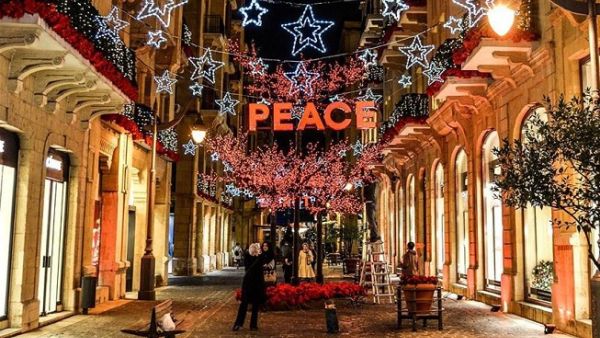Beirut’s major shopping districts are filled with sparkly Christmas decorations welcoming customers. But to the dismay of many Lebanese merchants, the streets are largely empty of holiday shoppers that would typically be found this time of year.
Retailers point to the political situation - mainly tensions in the Gulf and the war in Syria - for the drop in purchases compared with the same time in previous years.
“This is Christmas? This is an economic war,” said Antoine Wadih Salamoun, owner of the eponymous gold jewelry store at the Beirut Souks. He added business is down around 50 percent from the same time last year, which was already part of a string of around five bad years in a row.
Many shops count on end-of-year shoppers to make up for slow business for the rest of the year.
“Some days no one comes in,” he added, sitting with a colleague in a shop filled with beautiful jewelry, but no customers. He estimates that around 12 of his neighbors have closed shop in the past few months, pointing to closed storefronts across the courtyard of the gold souks. His other branch in Furn al-Shubak is doing slightly better, but business is still relatively slow.
Related stories:
- Lebanon's Political Scene Is Changing, So Is Its Economy
- Lebanon's Government Debt To Reach 140 Percent Of GDP In 2018: Moody's
Indeed, the entrance to the Beirut Souks is not what it used to be a year ago. One of the biggest retailers, the high-end TSC supermarket closed its doors in October, along with its other branches in Hamra and the Concorde (where most of the other main retailers have left), and the once-vibrant space remains shuttered. Similarly, in the popular Hamra district, foot traffic has also slowed down, as some of the popular retailers and bars have closed shop.
At a women’s formal dress shop across the street from the posh hotel Le Gray hotel in the downtown area, store manager Hoda Chahine said that business is down around 40 percent compared with last year. During the short-lived resignation of Prime Minister Saad Hariri, she said no one came, but then customers started gradually returning. She doesn’t see the slump as specific to this time of year, pointing out that several of her neighbors closed shop at the end of the summer. She also attributes the decline of foot traffic to the closure of the strip of trendy bars and restaurants on Uruguay Street about three years ago. Still, this month is hitting her particularly hard, as it’s usually a busy shopping month.
“This month is when all the shops should have lots of business to compensate for the rest of the year,” she said. “All areas in Beirut are affected, but downtown is really affected.”
At the jewelry shop Nada G., Georgette Karaki said that business is down by around 30 percent compared with last year. They’re doing what they can to publicize the store through social media, and they’ve recently launched three new jewelry models. The namesake of the business, Nada Ghazal, recently won the Brilliant Lebanese award, which they thought would bring in more customers. But business is still slow. They’re hoping to gain traction through online sales.
A salesman at Aishti told The Daily Star that this was their worst year in five years, with all branches suffering, particularly downtown.
Cesar Ouzounian, who has run his business Ouzounian Jewelry Manufacturers since 2002, says that business is down by about 20 to 30 percent compared with last year. He says he has seen worse years – 2005, 2006 and 2008 – possibly allowing him to see this as part of a cycle that will eventually recover. But that’s little comfort for this tough month.
“People aren’t coming to Lebanon,” he said. “We rely on this month a lot.”
By Brooke Anderson








